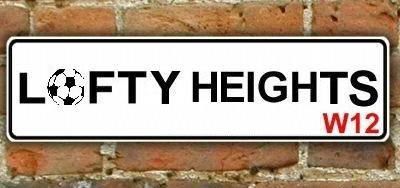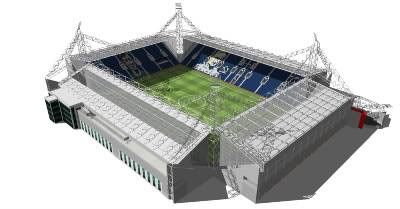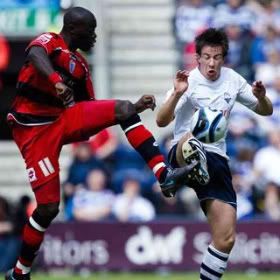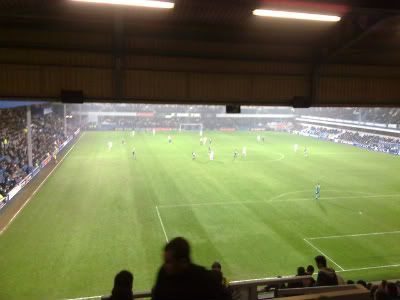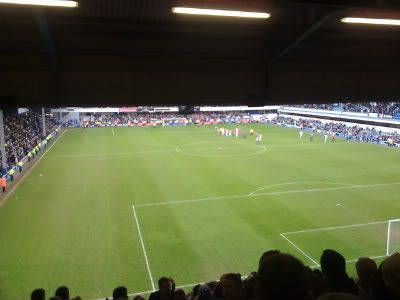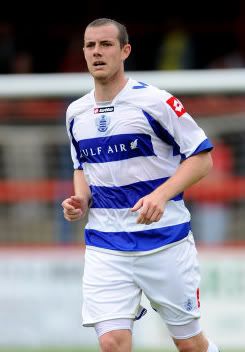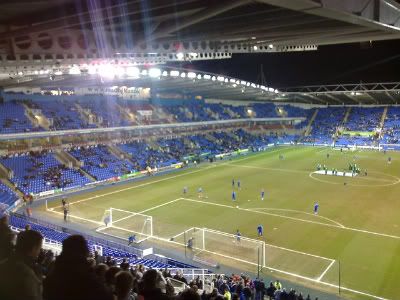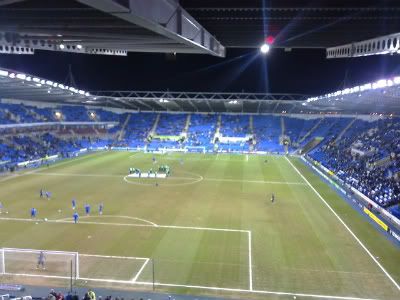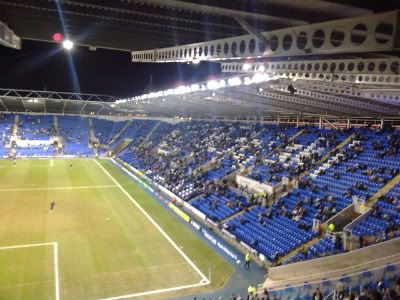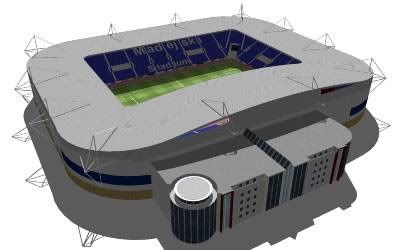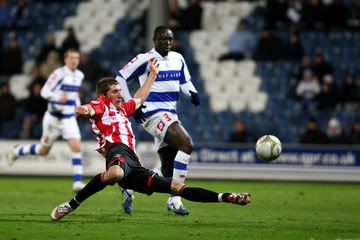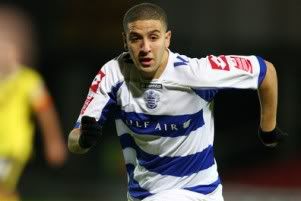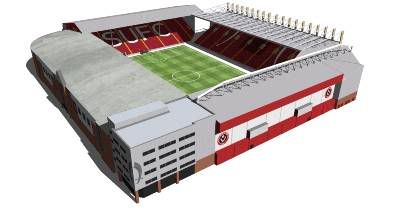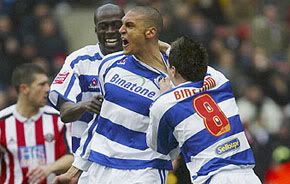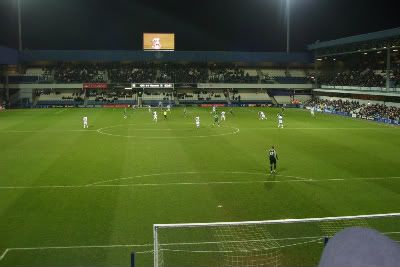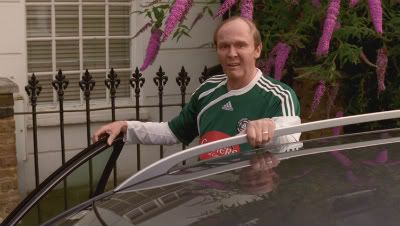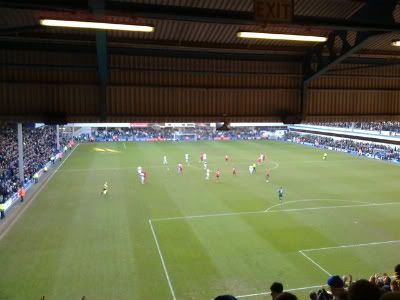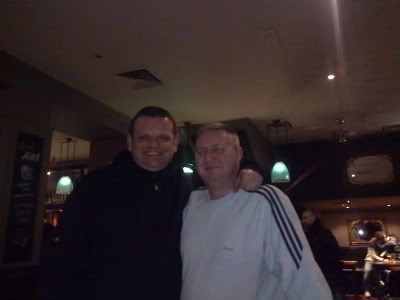R's on the Road To.......... Leicester City.
On Bank Holiday Monday hot on the heels of the Sheffield Wednesday game the R’s face a tricky fixture against high flying Leicester City. With The Foxes in the Play Off places and looking certain to take part in the end of season shoot out for the final promotion place to the Premiership this looks to be the R’s toughest test at The Walkers Stadium, a ground that we have enjoyed visiting in recent years.
Here are a few bits that you may find useful in the build up to the game.

Club History.
Leicester were formed in 1884 by a group of old boys at Wyggeston School under the name of Leicester Fosse and in 1890 the club joined the Football Association. A year later the club moved to Filbert Street which was to be the clubs home for over 111 years. Previously the club had five different homes which included Victoria Park and the Belgrave Cricket and Bicycle Ground.
The club joined the Midland League in 1891 and it was in 1894 that Leicester Fosse were elected to the Football League Division 2 having finished 4th in the league.
The clubs first game in the Football League ended in a 4-3 defeat at Grimsby but this was quickly followed up with a first win in their first home league game at Filbert Street against Rotherham. In the same season the club recorded their largest win to date, a 13-0 victory over Notts Olympic in an FA Cup qualifying match.
In the 1907-08 season Leicester Fosse finished second in Division 2 and gained promotion to the top tier for the first time in their history. The following season the club were relegated back to Division 2 in a season that included the clubs record defeat, a 12-0 loss to Nottingham Forest.
In 1919 when the League resumed after World War 1, Leicester Fosse ceased trading due to financial difficulties which have not been disclosed. The club were soon reformed as Leicester City, which was appropriate due to the borough of Leicester just gaining City status.
In 1949 the club reached their first FA Cup final but ended up losing to Wolves 1-0. Just a week later the club were celebrating however when a draw secured the clubs position in Division 2 having been threatened by relegation.
In 1959 one the clubs most successful managers, Matt Gillies, took the helm and in 1961 and 1963 lead The Foxes to the FA Cup final but on both occasions finished runners up to Spurs and Manchester United respectively. Despite the clubs knock back in 1963 it was the following season that saw the club pick up their first Cup success by winning the League Cup with a 4-3 aggregate victory over Stoke. The following season the club reached the League Cup final once more but this time lost 3-2 on aggregate to Chelsea. Gillies resigned in November 1968 after a poor start to the season and his successor Frank O’Farrell reached the FA Cup final, the final appearance to date for the club, and once again the club failed to secure success in the competition after losing 1-0 to Manchester City. That same season the club were relegated to Division 2.
The 1990’s saw the club rise into the Premiership having first lost in the Play Off Finals to Blackburn in 1991-92 and then losing in the final in 1992-93 to Swindon 4-3, having been 3-0 down. However in the 1993-94 Play Off Final the club beat Derby 2-1 to reach the Premiership under Brian Little’s guidance. Little then left his post the following November and was replaced by Mark McGhee, who saw the club relegated back to Division 1 after only one season in the top flight. In December 1995 McGhee left The Foxes to join Wolves and his replacement was highly regarded manager Martin O’Neill. Under O’Neill’s guidance the club secured a Play Off place and a last gasp Steve Claridge goal in the Final against Crystal Palace secured the clubs instant return to the Premiership. The following season Leicester won their first piece of silverware in 26 years when they won the League Cup against Middlesbrough in a replay at Hillsborough in 1997. In 1999 the club once again reached the Final and were defeated by Spurs 1-0. An instant return to the 2000 final was secured and O’Neill’s Foxes defeated Tranmere 2-1 as the club enjoyed its third success of the competition. After the 2000 final O’Neill was lured away to take charge of Celtic after enjoying four successive top ten finishes to go with his two League Cup triumph’s and one runners up medal in the same competition, cementing O’Neill’s place as the clubs most successful manager.
Two seasons later the club got relegated down to the newly formed Championship and since then have not returned to the top flight.
Having been relegated to League One during Ian Holloway’s reign in the 2007-08 season it was Nigel Pearson that took the leading role in leading Leicester to an instant return to the Championship by winning the League at the first attempt.
The Stadium.
Current Capacity – 32,500.
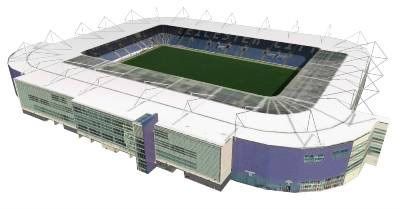
Leicester moved to the Walkers Stadium in 2002 having spent 111 years at nearby Filbert Street.
The stadium is a modern bowl shaped model that is fully enclosed and equal heights all the way around. The stadium cost £35 million to construct.
The away fans are housed in the North east corner of the ground where around 3,000 visiting fans can be accommodated.
The atmosphere in the ground on our previous visits has been pretty good. If we score and everyone in jumping around you can feel the stand rocking underneath your feet. The atmosphere is also added to by the Leicester drummer that will be on your right hand side right at the back of the stand. On our visit in 2006 I can vividly remember there being some good banter between the Rangers’ support and the drummer which ended in the drummer giving 10 big bangs and then being so knackered from his efforts that he went quiet for 10-15 minutes or so.
The concourse is of a fair size and has TV screens that will show the action whilst the game is in play, so if you need to nip downstairs for refreshments you shouldn’t miss any of the action.
The History between the teams.
At Leicester City (24)
Leicester City 13
QPR 6
Draw 5
The R’s are unbeaten in their last three fixtures at the Walkers Stadium, a run that stretches back until September 2005.
Having lost 1-0 to Leicester in the first meeting at the Walkers in Jan 2005, Rangers’ went there the following season in September 2005 seeking revenge. Marc Nygaard got the R’s off to the perfect start when he headed home from a Lee Cook free kick. With just 20 minutes on the clock Leicester were then given an even more uphill struggle after Alan Maybury was dismissed when he mistimed a tackle on Paul Furlong. Despite their numerical disadvantage it was Leicester that equalised with 20 minutes to go, Elvis Hammond fired home from inside the area and left R’s ‘keeper Simon Royce with no chance. However with 4 minutes left Rangers’ regained the lead when Furlong stabbed home the winner after Lomas had lumped a long ball up to Furlong, who in turn played the ball to Nygaard before receiving the ball back from the big Dane and grabbing his first goal of the season and sealing Rangers’ first away win of the season.
The following year Rangers’ enjoyed an even better win at the Walkers. A 3-1 win was dubbed by many who attended the game as ‘I was there when Nygaard scored’ after the big Dane scored a penalty and then followed it up with an audacious volley from 30 yards out when out on the right wing! On loan Indigo Idiakez scored the opener just after half time when Lee Cook’s cross was nodded back by Nygaard and Idiakez was on hand to power home a header.
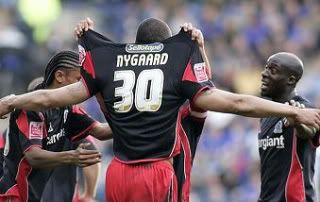
The last encounter was a 1-1 draw. Ian Hume gave Leicester a second half lead from the penalty spot but 10 minutes from time Mikele Leigertwood thumped home an effort from 30 yards out that found the bottom corner.
Will the run continue? We will find out on Monday.
How to get there.
By Car: - The postcode for the Walkers Stadium is LE2 7FL.
Leave the M1 at Junction 21 and follow the A5460 that will lead you to Leicester City centre. Go down this road until u pass under a railway bridge, 200 yards after this is a set of traffic lights, turn right here (Upperton Road). As you go down this road you will see the stadium appear on your right hand side just before you reach the roundabout, take a right at the roundabout and follow the road round until you get to the Walkers. You will pass the site of Leicester’s old Filbert Street ground.
By Train: - The train station is in the City Centre and will take you around 20-25 minutes to walk to the ground should you choose to walk the distance.
Come out of the station, cross the road in front of the station and proceed to the left. Follow this round to the right and now you are walking with the main Central Ring Road (Waterloo Way) on your left. Keep this to your left as the pavement becomes a separate path and the road sinks down into a dip down to your left. A quick left and right to stay on the pathway as it crosses New Walk and you go down the left hand side of New Walk Museum. The pathway rejoins the main road as pavement again and you see Nelson Mandela Park on your right. Turn right into Lancaster Rd and then cross the park to the crossings over the main road by the public lavatories. Head for the Victory pub opposite, turn left across the front of the Leicester Royal infirmary. First right into Walnut St and you can see the stadium behind the old Filbert Street ground.
Pubs 'n' Grub.
I would highly recommend the Counting House pub which is just to the side of the big Morrison’s supermarket. In my visits there I have always witnessed a friendly atmosphere within the pub which is shared by both sets of supporters. Food is also served in the pub so it ticks all the boxes in terms of pre match entertainment. The pub is a 5-10 minute walk from the stadium and it located just off of Aylestone Road.




